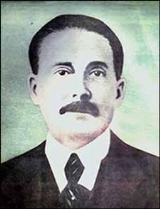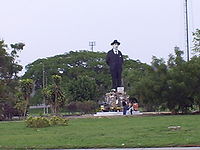
José Gregorio Hernández
Encyclopedia
José Gregorio Hernández, SFO
[er-NAHN-des] (October 25, 1864 - June 29, 1919) was a Venezuela
n physician
. Born in Isnotú, Trujillo State, Venezuela
, he went on to reach legendary status, more so after his death.
In 1888 Hernández graduated as a medical doctor
in the Universidad Central de Venezuela
, in Caracas
. The Venezuelan government awarded him a grant to continue his studies in Europe
. Hernández traveled to Paris, France, where he studied other fields of medicine such as bacteriology
, pathology
, microbiology
and histology
, and physiology
. Following his return to Venezuela, he became a leading doctor at the Hospital José María Vargas.
 Between 1891 and 1916, Hernández dedicated himself to teaching, medicine, and religious practice. He sought priesthood on two occasions, but his fragile physical conditions would ultimately prevent him from achieving that status. He studied at the Monastery of Lucca in Italy
Between 1891 and 1916, Hernández dedicated himself to teaching, medicine, and religious practice. He sought priesthood on two occasions, but his fragile physical conditions would ultimately prevent him from achieving that status. He studied at the Monastery of Lucca in Italy
for ten months in 1908. In 1913, he enrolled at the Latin American Pío School of Rome to continue the priestly career, but had to return to Venezuela for health reasons. Among the scientific publications of this famous Venezuela
n are The Elements of Bacteriology (1906), About the Angina Pectoris of Malaric Origin (1909) and The Elements of Philosophy (1912).
Dr. Hernández treated the poor for free and even bought them medicines with his own money. One day, while bringing medicine to the home of one of his patients in Caracas, Hernández was struck by a car and killed.
After his life, the legend of Dr. Hernández began to grow in Venezuela. People around the country started claiming to have been granted miracles after praying to him. At present, Dr. Hernandez is commonly invoked as "José Gregorio" by both doctors and patients for healing purposes.He is also called upon for protection during overland journeys. Eventually, his name became known all over Latin America
and Spain
.
In 1949, Venezuelan Catholic Church
officials began the process that would lead the beatification of Dr. Hernández. The process of his canonisation commenced during the Vatican
I , which had granted him the title of «Venerable
» in 1985. His remains are housed in the Holy Church of La Candelaria in Caracas, Venezuela.
He is also revered by the María Lionza
religion of Venezuela. Historian Steven Palmer has drawn parallels between the Hernández cult and that of the assassinated Costa Rican physician and politician Ricardo Moreno Cañas
.
Secular Franciscan Order
thumb|rigth|Lapel pin of Secular Franciscan Order.The Secular Franciscan Order is a community of Catholic men and women, of any of the Rites in communion with Rome , in the world who seek to pattern their lives after Christ in the spirit of St. Francis of Assisi. Secular Franciscans are...
[er-NAHN-des] (October 25, 1864 - June 29, 1919) was a Venezuela
Venezuela
Venezuela , officially called the Bolivarian Republic of Venezuela , is a tropical country on the northern coast of South America. It borders Colombia to the west, Guyana to the east, and Brazil to the south...
n physician
Physician
A physician is a health care provider who practices the profession of medicine, which is concerned with promoting, maintaining or restoring human health through the study, diagnosis, and treatment of disease, injury and other physical and mental impairments...
. Born in Isnotú, Trujillo State, Venezuela
Venezuela
Venezuela , officially called the Bolivarian Republic of Venezuela , is a tropical country on the northern coast of South America. It borders Colombia to the west, Guyana to the east, and Brazil to the south...
, he went on to reach legendary status, more so after his death.
In 1888 Hernández graduated as a medical doctor
Medicine
Medicine is the science and art of healing. It encompasses a variety of health care practices evolved to maintain and restore health by the prevention and treatment of illness....
in the Universidad Central de Venezuela
Central University of Venezuela
The Central University of Venezuela is a premier public University of Venezuela located in Caracas...
, in Caracas
Caracas
Caracas , officially Santiago de León de Caracas, is the capital and largest city of Venezuela; natives or residents are known as Caraquenians in English . It is located in the northern part of the country, following the contours of the narrow Caracas Valley on the Venezuelan coastal mountain range...
. The Venezuelan government awarded him a grant to continue his studies in Europe
Europe
Europe is, by convention, one of the world's seven continents. Comprising the westernmost peninsula of Eurasia, Europe is generally 'divided' from Asia to its east by the watershed divides of the Ural and Caucasus Mountains, the Ural River, the Caspian and Black Seas, and the waterways connecting...
. Hernández traveled to Paris, France, where he studied other fields of medicine such as bacteriology
Bacteriology
Bacteriology is the study of bacteria. This subdivision of microbiology involves the identification, classification, and characterization of bacterial species...
, pathology
Pathology
Pathology is the precise study and diagnosis of disease. The word pathology is from Ancient Greek , pathos, "feeling, suffering"; and , -logia, "the study of". Pathologization, to pathologize, refers to the process of defining a condition or behavior as pathological, e.g. pathological gambling....
, microbiology
Microbiology
Microbiology is the study of microorganisms, which are defined as any microscopic organism that comprises either a single cell , cell clusters or no cell at all . This includes eukaryotes, such as fungi and protists, and prokaryotes...
and histology
Histology
Histology is the study of the microscopic anatomy of cells and tissues of plants and animals. It is performed by examining cells and tissues commonly by sectioning and staining; followed by examination under a light microscope or electron microscope...
, and physiology
Physiology
Physiology is the science of the function of living systems. This includes how organisms, organ systems, organs, cells, and bio-molecules carry out the chemical or physical functions that exist in a living system. The highest honor awarded in physiology is the Nobel Prize in Physiology or...
. Following his return to Venezuela, he became a leading doctor at the Hospital José María Vargas.

Italy
Italy , officially the Italian Republic languages]] under the European Charter for Regional or Minority Languages. In each of these, Italy's official name is as follows:;;;;;;;;), is a unitary parliamentary republic in South-Central Europe. To the north it borders France, Switzerland, Austria and...
for ten months in 1908. In 1913, he enrolled at the Latin American Pío School of Rome to continue the priestly career, but had to return to Venezuela for health reasons. Among the scientific publications of this famous Venezuela
Venezuela
Venezuela , officially called the Bolivarian Republic of Venezuela , is a tropical country on the northern coast of South America. It borders Colombia to the west, Guyana to the east, and Brazil to the south...
n are The Elements of Bacteriology (1906), About the Angina Pectoris of Malaric Origin (1909) and The Elements of Philosophy (1912).
Dr. Hernández treated the poor for free and even bought them medicines with his own money. One day, while bringing medicine to the home of one of his patients in Caracas, Hernández was struck by a car and killed.
After his life, the legend of Dr. Hernández began to grow in Venezuela. People around the country started claiming to have been granted miracles after praying to him. At present, Dr. Hernandez is commonly invoked as "José Gregorio" by both doctors and patients for healing purposes.He is also called upon for protection during overland journeys. Eventually, his name became known all over Latin America
Latin America
Latin America is a region of the Americas where Romance languages – particularly Spanish and Portuguese, and variably French – are primarily spoken. Latin America has an area of approximately 21,069,500 km² , almost 3.9% of the Earth's surface or 14.1% of its land surface area...
and Spain
Spain
Spain , officially the Kingdom of Spain languages]] under the European Charter for Regional or Minority Languages. In each of these, Spain's official name is as follows:;;;;;;), is a country and member state of the European Union located in southwestern Europe on the Iberian Peninsula...
.
In 1949, Venezuelan Catholic Church
Catholicism
Catholicism is a broad term for the body of the Catholic faith, its theologies and doctrines, its liturgical, ethical, spiritual, and behavioral characteristics, as well as a religious people as a whole....
officials began the process that would lead the beatification of Dr. Hernández. The process of his canonisation commenced during the Vatican
Holy See
The Holy See is the episcopal jurisdiction of the Catholic Church in Rome, in which its Bishop is commonly known as the Pope. It is the preeminent episcopal see of the Catholic Church, forming the central government of the Church. As such, diplomatically, and in other spheres the Holy See acts and...
I , which had granted him the title of «Venerable
Venerable
The Venerable is used as a style or epithet in several Christian churches. It is also the common English-language translation of a number of Buddhist titles.-Roman Catholic:...
» in 1985. His remains are housed in the Holy Church of La Candelaria in Caracas, Venezuela.
He is also revered by the María Lionza
Maria Lionza
María Lionza is the central figure in one of the most widespread indigenous religions in Venezuela. Her religion is a blend of African, indigenous, and Catholic beliefs similar to the Caribbean Santería. She is revered as a goddess of nature, love, peace, and harmony...
religion of Venezuela. Historian Steven Palmer has drawn parallels between the Hernández cult and that of the assassinated Costa Rican physician and politician Ricardo Moreno Cañas
Ricardo Moreno Cañas
Ricardo Moreno Cañas was a Costa Rican politician. He was assassinated by Beltrán Cortés....
.

